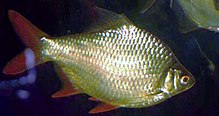Tinfoil barb
| Tinfoil barb | |
|---|---|
 |
|
|
Not evaluated (IUCN 3.1)
|
|
| Scientific classification | |
| Kingdom: | Animalia |
| Phylum: | Chordata |
| Class: | Actinopterygii |
| Order: | Cypriniformes |
| Family: | Cyprinidae |
| Genus: | Barbonymus |
| Species: | B. schwanenfeldii |
| Binomial name | |
|
Barbonymus schwanenfeldii (Bleeker, 1853) |
|
| Synonyms | |
|
Barbodes schwanefeldii (lapsus) |
|
Barbodes schwanefeldii (lapsus)
Barbodes schwanenfeldii (Bleeker, 1853)
Barbonymus schwanefeldii (lapsus)
Barbus schwanefeldii (lapsus)
Barbus schwanenfeldii Bleeker, 1853
Puntius schwanefeldii (lapsus)
Puntius schwanenfeldii (Bleeker, 1853)
The tinfoil barb (Barbonymus schwanenfeldii) is a tropical Southeast Asian freshwater fish of the family Cyprinidae. This species was originally described as Barbus schwanenfeldii by Pieter Bleeker in 1853, and has also been placed in the genera Barbodes and Puntius. The specific epithet is frequently misspelled schwanefeldii.
Nowadays it is usually placed in the genus Barbonymus, which was only established in 1999. It is the genus' type species, and indeed seems to represent a quite distinct lineage of large "barbs". It is not very similar to the barbels which are the core of the genus Barbus, and though closer to these than to some African barbs, they seem to be closer still to the common carp (Cyprinus carpio) and to Cyclocheilichthys than to either of the aforementioned.
It is distinguishable from other species of the genus in having a red dorsal fin with a black blotch at the tip, red pectoral, pelvic and anal fins, red caudal fin with white margin and a black submarginal stripe along each lobe, and 8 scale rows between dorsal-fin origin and lateral line. Large individuals are silvery or golden yellow while alive with its dorsal fin red and caudal fin orange or blood-red. It grows up to 14 inches (35 cm) in length. Tinfoil barbs have a lifespan of 8 to 10 years.
...
Wikipedia
